Traveling with a baby can be a challenging endeavor, especially when it comes to ensuring their comfort and safety during flights.
As parents, your child’s well-being is your top priority, and this includes their comfort while flying. One solution that has gained popularity among parents is the use of bassinets on airplanes.
In this guide, we’ll delve into the ins and outs of using bassinets on airplanes, providing valuable insights for mothers and parents across the US.
Understanding Bassinets on Airplanes
Bassinets, also known as sky cots or airplane baby beds, are specially designed beds for infants that attach to the bulkhead wall of the airplane cabin.
These compact sleeping spaces offer your baby a comfortable and secure place to rest during long flights.
Airlines often provide bassinets as a service to parents traveling with infants, typically free of charge, but with certain restrictions and guidelines.
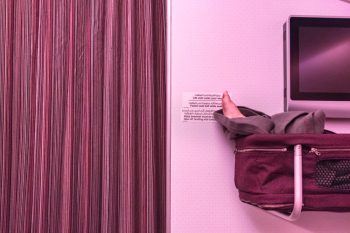
Benefits of Using Bassinets on Airplanes
1. Comfort: Bassinets provide your baby with a cozy and safe space to nap or sleep during the flight, ensuring they are well-rested upon arrival.
2. Hands-Free Time: Having your baby in a bassinet allows you some much-needed hands-free time to enjoy your meal or relax.
3. Reduced Stress: With your baby comfortably sleeping in the bassinet, you can focus on your own well-being and make the flight experience less stressful.
Airlines Offering Bassinets
Several major airlines offer bassinets on specific aircraft, including Delta, American Airlines, United Airlines, and more.
It’s essential to check with your chosen airline before booking to confirm their bassinet availability and any specific guidelines they have in place.
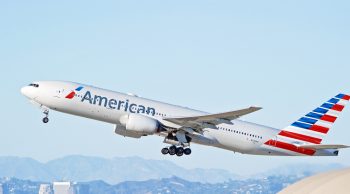
How to Secure a Bassinet
1. Early Booking: Bassinets are limited in number, so it’s crucial to book your tickets early and make a request for a bassinet at the time of booking.
2. Check Eligibility: Bassinets are generally available for infants up to a certain weight or age. Confirm your child’s eligibility before requesting a bassinet.
3. Seat Selection: Bulkhead seats are typically the designated areas where bassinets can be set up. When selecting seats, choose the bulkhead row to maximize your chances of securing a bassinet.
Guidelines for Using Bassinets on Airplanes
1. Infant Age and Weight: Most airlines allow babies up to approximately 6-8 months of age and around 20-25 pounds to use the bassinet. However, these numbers can vary, so it’s essential to check with your specific airline.
2. Securing the Baby: Once the seatbelt sign is turned off after takeoff, you can secure your baby in the bassinet using the provided straps to prevent any accidents during turbulence.
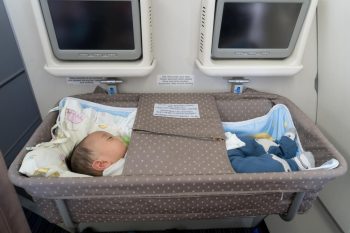
3. Supervision: While your baby is resting in the bassinet, it’s crucial to keep a watchful eye on them at all times. The bassinet is not a substitute for your arms.
Packing Essentials for Bassinet Use
1. Baby Blanket: To keep your little one warm and comfortable while sleeping.
2. Baby’s Favorite Toys: Familiar toys can provide comfort and entertainment during the flight.
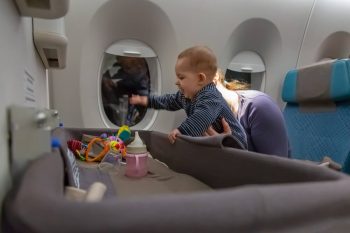
3. Extra Diapers and Clothing: Be prepared for any diaper mishaps or spills.
Tips for a Smooth Bassinet Experience
1. Arrive Early: Arrive at the airport with plenty of time to spare to ensure you have ample time for check-in and setting up the bassinet.
2. Communicate with Cabin Crew: Once on the flight, communicate with the cabin crew regarding your intention to use the bassinet. They will guide you through the process and provide assistance.
3. Keep Essentials Handy: Pack a small bag with essentials such as baby wipes, diapers, and a change of clothes, so you don’t have to disturb your sleeping baby unnecessarily.
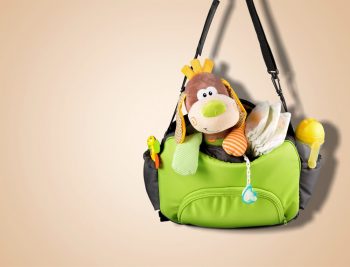
Traveling with a baby doesn’t have to be a daunting task, especially with the convenience of bassinets on airplanes.
These specially designed sleeping spaces offer a comfortable and secure place for your little one to rest during long flights, allowing you to enjoy a smoother travel experience.
By understanding the guidelines, securing a bassinet, and packing the essentials, you can make your journey a pleasant one for both you and your baby.
As a parent, your ability to provide a comfortable and safe environment for your child during air travel is an invaluable skill that can lead to more enjoyable family adventures.


